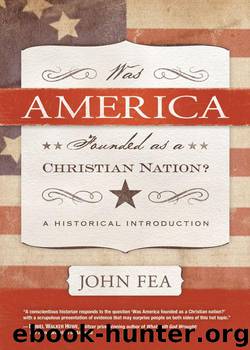Was America Founded As a Christian Nation? by John Fea

Author:John Fea
Language: eng
Format: mobi
ISBN: 9780664235048
Publisher: Westminster John Knox Press
Published: 2011-04-13T06:00:00+00:00
Fig. 9.1 Thomas Jefferson’s tombstone at Monticello. Jefferson believed the Virginia Statute for Religious Freedom was one of his greatest achievements.
Massachusetts and Religious Establishment
When it comes to state constitutions promoting religious freedom, Virginia was the exception rather than the rule. Like Virginia, Massachusetts had a long history of government support for Christianity. As we saw in chapter 5, Massachusetts was meant to be a “city upon a hill,” a Calvinist utopia in the new world where political leadership would be carried out by true believers in the Puritan way. During the earliest years of settlement in Massachusetts, dissenters were often removed from the colony for espousing theological views that did not conform to Puritan orthodoxy. Any state constitution in Massachusetts would thus need to reckon with this history. The chances that the framers of the Massachusetts constitution would endorse the kind of religious liberty enjoyed by Virginia were slim.
The Massachusetts Constitution of 1780 affirmed that all members of society had the “right as well as the duty” to “worship the SUPREME BEING, the great Creator and Preserver of the universe.” The framers of this state constitution—John Adams was the primary drafter—had a limited understanding of what constituted the religious rights of its citizens. The people of Massachusetts had the right to worship the “Supreme Being,” the “Creator,” and the “Preserver of the universe.” By implication, religious rights were not afforded to those who did not worship this God. The constitution suggests that the worship of God is not only a “right” but a “duty.” This emphasis on duty reflects the historic New England Puritan ideal that individual rights must always be understood within the context of the responsibilities one has to the larger Christian community.13
The Massachusetts Constitution did, however, affirm liberty of conscience in matters of religion. It states that “no subject shall be hurt, molested, or restrained, in his person, liberty or estate, for worshipping GOD in the manner and season most agreeable to the dictates of his own conscience.” Citizens of the state could freely, without any government interference, practice their religious faith, but the wording of this clause suggests that such religious freedom applied only to those who worship God. When the framers wrote about worshiping God, they probably had the Protestant God in mind. Unlike Virginia, the government would collect taxes to support public worship and Protestant teachers of “piety, religion, and morality.” The Congregational Church would remain the state’s established religion, but those who were not part of this church would be permitted to use their tax dollars for the “support of the public teacher or teachers of his own religious sect or denomination.” This assumed that there was a minister available from such a dissenting denomination or sect. Those who did not have a Protestant minister to support, or who were not affiliated with any congregation, would need to pay a tax toward the support of the Congregational Church. Thus, while the Massachusetts Constitution allowed non-Congregationalist Protestants to worship freely and direct their taxes
Download
This site does not store any files on its server. We only index and link to content provided by other sites. Please contact the content providers to delete copyright contents if any and email us, we'll remove relevant links or contents immediately.
The Gnostic Gospels by Pagels Elaine(2532)
Jesus by Paul Johnson(2363)
Devil, The by Almond Philip C(2333)
The Nativity by Geza Vermes(2233)
The Psychedelic Gospels: The Secret History of Hallucinogens in Christianity by Jerry B. Brown(2158)
Forensics by Val McDermid(2094)
Going Clear: Scientology, Hollywood, and the Prison of Belief by Lawrence Wright(1985)
Going Clear by Lawrence Wright(1968)
Barking to the Choir by Gregory Boyle(1822)
Old Testament History by John H. Sailhamer(1818)
Augustine: Conversions to Confessions by Robin Lane Fox(1774)
The Early Centuries - Byzantium 01 by John Julius Norwich(1746)
A History of the Franks by Gregory of Tours(1729)
A Prophet with Honor by William C. Martin(1728)
Dark Mysteries of the Vatican by H. Paul Jeffers(1723)
The Bible Doesn't Say That by Dr. Joel M. Hoffman(1682)
by Christianity & Islam(1636)
The First Crusade by Thomas Asbridge(1611)
The Amish by Steven M. Nolt(1575)
